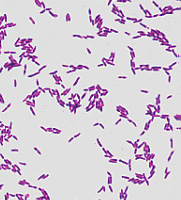Eating Germs to Stay Well
 Consider this: you come down with productive cough, fever, chills. The chest Xray indicates an infiltrate in your lung fields. Your doctor prescribes antibiotics, and the symptoms subside, you feel better. What do you do next? According to this newsrelease, you should probably eat some germs. Lactobacilli to be specific. Normal gut flora that make vitamins for you and keep the bad bacteria and yeast from setting up shop in your belly. Read on:
Consider this: you come down with productive cough, fever, chills. The chest Xray indicates an infiltrate in your lung fields. Your doctor prescribes antibiotics, and the symptoms subside, you feel better. What do you do next? According to this newsrelease, you should probably eat some germs. Lactobacilli to be specific. Normal gut flora that make vitamins for you and keep the bad bacteria and yeast from setting up shop in your belly. Read on:Once outside the womb, we are bombarded by microbes and soon we have 10 times more microbes in our body than the number of cells that make up the human body.
It is the bad microbes that cause disease. Good microbes work with the body's immune system to keep the bad microbes at bay by crowding them out. In the symbiotic relationship between good and bad microbes, recent research has uncovered the importance of these good microbes.
“The good microbes - and this is where probiotics come in - keep the bad microbes in small numbers. But they also stimulate the immune system and improve our digestive function. That's the subject of research that has been going on for years,” Huffnagle says.
Probiotics are bacteria that we eat and they're good for our health. They are found in a number of foods that are readily available in the supermarket, and they taste good. You can support probiotic growth by increasing the amount of cultured dairy products you eat, such as cheeses and yogurt, and the foods that encourage probiotics from these dairy products to multiply even further: spices, tea, red wine, berries, apples and beans.

Huffnagle says that most of these good microbes exist within our body in the digestive track, with the largest number occurring in the small and large intestines.
“It's the job of these good microbes to stimulate our immune system, and the other job they do is to stimulate good digestive health,” he says.
Not only that, but the good bacteria are capable of producing antibiotics that attack bad bacteria. Follow along from this newsreport:
Nisin, a peptide, contains 34 amino acid residues and the unusual amino acids lanthionine, methyllanthionine, dehydroalanine and dehydro-amino-butyric acid. The latter are made by post-translational modification of proteins.
Nisin works well against Gram-positive bacteria and food-borne pathogens that cause botulism and listeriosis because it punches holes into cell membranes and binds to essential molecules in the disease-causing bacteria. Hitting on at least two targets reduces the risk of resistance occurring, van der Donk said.
The researchers synthesized nisin simply in a test tube by using a single cyclase enzyme to re-create the process that normally occurs in a strain of the bacterium Lactococcus lactis found naturally in milk. They demonstrated how just one protein (NisC) makes 10 new chemical bonds in a stereochemically defined fashion. Specifically, they showed that NisC is responsible for the formation of five characteristic thioether rings required for nisin's biological activity.
"Despite all the progress in synthetic chemistry, we cannot come close to making a compound like nisin efficiently," van der Donk said. "Synthetic chemists in the past needed 67 steps to make it, while nature uses just two enzymes. One of these is the cyclase whose activity we have demonstrated in this paper."
Read more here.
When you are born, your gastrointestinal tract is sterile. As soon as you began eating, your gut was colonised by bacteria. If you were breast-fed, you were lucky enough to receive booster nutrients that promoted bifidobacteria, which prevent colonisation by pathogenic bacteria. Other food sources, although nutritious enough, lack that advantage.
Gut bacteria produce vitamins B12 and K for us, as well as keeping out the bad germs. Genetically engineered gut bacteria could do much more for us, and would be a natural way of introducing genetically engineered resveratrol, curcumin, or capsaicin or other natural substances known to counter cancer or promote longevity.
Most of us do not like to think about what goes on inside of us, until we get sick, then we definitely want a physician to think very hard about what is inside of us and how to make it better. But would it not be better to stay well, if you had the choice?
Labels: longevity, microbes, natural pharmaceuticals, probiotics

0 Comments:
Post a Comment
“During times of universal deceit, telling the truth becomes a revolutionary act” _George Orwell
<< Home